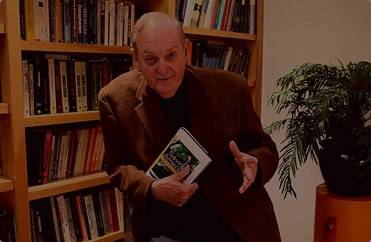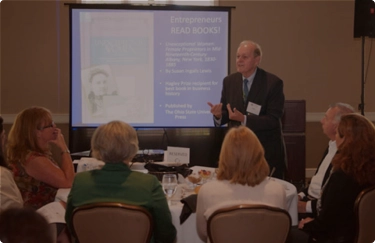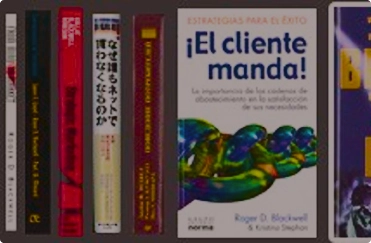Renowned marketing expert and bestselling author known for his insights on branding, prosperity and consumer trends
Roger Blackwell, Ph.D
Roger Blackwell is an American marketing expert, renowned business author of over 40 business marketing books, and public speaker. He has served on the board of directors for multiple companies, most prominently Max & Erma's Restaurant, Inc., Abercrombie & Fitch, and Worthington Foods. Blackwell was a long-time marketing professor at The Ohio State University,and has also taught at Stanford University, Cape Town University in South Africa, and Guelph University in Canada. Sales and Marketing Executives International named him an Outstanding Marketing Professor in America. He is well known for his model of the consumer decision-making process.

Featured In
Objective Prosperity
This is not a book of simple answers to all of the world's problems. There are certainly enough “expert opinions” on the planet to go around. Instead, this book provides a method for you to arrive at your own answers not driven by upcoming elections and TV ratings. Throughout the text, there will be a number of explanations, recommendations, and examples to identify solutions to improve your own prosperity and to evaluate the policies that seek to improve the economy around you.
"Objective Prosperity will make you think. What factors influence the chances for individual success and national prosperity? How does behavioural economics help us understand who is financially rewarded? How can you prosper even if you were born poor? What is the best way to manage your savings? The authors cite many profound thinkers on how to live a rewarding life."Philip KotlerS.C. Johnson & Son Distinguished Professor of International Marketing, emeritus, Kellogg School of Management, Northwestern University
“This book is one of the first that I could not put down the first read, and enjoyed it the 2nd and 3rd times even more. Each time I found new thoughts. This book is a must read for any entrepreneur, to keep eyes wide open to the rapidly changing consumer environment and how to think ahead.”Rhett C. RicartChief Executive Officer and Dealer Principal 2020 Chairman National Automobile Dealers Association
“Like having an advanced degree in business and life—in your hand” This book covers so many important topics it’s better than an MBA, because it’s written by a pair of distinguished professors who also understand the real world of business and economics. Make no mistake, you won’t learn some of the things taught in MBA curriculum—you’ll Read more...John MariottiAuthor of The Chinese Conspiracy
From the Desk of Dr. Blackwell
Are you looking for a summer reading suggestion? You might expect me to recommend a non-fiction book since that’s what I write, but I suggest a recently released novel that is both gripping and highly informative. You can learn from novels as well as be entertained. That was true about Fyodor Dostoevsky whose description of the human psyche in The Brothers Karamazov was as profound (or more so) than Freud. His psychological principles about reward and punishment have been replicated by hundreds of experiments a hundred years after Dostoevsky wrote his classic novels. And if you like fast-paced but accurate legal details that make John Grisham’s novels so believable, you will relish just-released Chinese Conspiracy by John Mariotti. Chinese Conspiracy is fiction, but fact-based as well as fascinating. As a rule, absorbing novels also have a few romantic episodes, and yes, this novel follows that rule. While reading this intriguing and riveting saga, you gain fascinating insights into at least three cultures: China (along with Iran and Pakistan), Rural America (specifically West Virginia), and U.S. government agencies (CIA, FBI, DHS and other D.C. bureaucracies). Will the quest between China and the U.S. for world dominance be won with nuclear bombs […]
The topic in my latest book, Objective Prosperity, “Why Some Countries are Rich and Why Some Countries Are Poor” just won the Nobel Prize for Economics. Those words are chosen carefully; it was the topic, not my book that won the Nobel Prize. The winners were Daron Acemoglu, Simon Johnson and James A. Robinson of MIT and Chicago Booth School of Business for research in their book, Why Nations Fail. Jakob Svensson, chair of the Committee for the Prize in Economic Sciences, said their analysis has provided “a much deeper understanding of the root causes of why countries fail or succeed.” The Associated Press called it the most important topic in economics, and a clear signal that the causes are different than conclusions from traditional economics. But you already knew that if you read Objective Prosperity by Blackwell and Bailey. You know that behavioral economics provides a richer understanding of why some people live in poverty compared to those who are prosperous. Our book is more recent than Acemoglu et. al. and shows how attributes that make a nation prosperous also make people and organizations prosperous. In other words, we show how the principles that won the Nobel prize also […]
You may have heard someone say, “he was boogieing it up” referring to being something other than their actual selves. Is that good or bad? Emulating aristocratic possessions is not good, of course, but the term is derived from Bourgeois values – behavior guided by middle class values. Research by behavioral economist Dr. Diedre McClosky, whom we reference extensively in our recent book, documents that values achieving prosperity are bourgeois. We do not define prosperity in our book because we want every reader to develop their personal definition of prosperity. We also want each reader to draw their own conclusions about values that lead to their own prosperity, but law professors Amy Wax and Larry Alexander generated considerable controversy when they published the following summary of values creating prosperity. “Get married before you have children and strive to stay married for their sake. Get the education you need for gainful employment, work hard and avoid idleness. Go the extra mile for your employer or client. Be a patriot, civic-minded and charitable. Avoid coarse language in public. Be respectful of authority. Eschew substance abuse and crime.” (WSJ) What do you think, did these values make America great? Do they lead to […]







